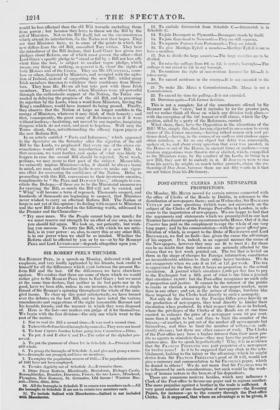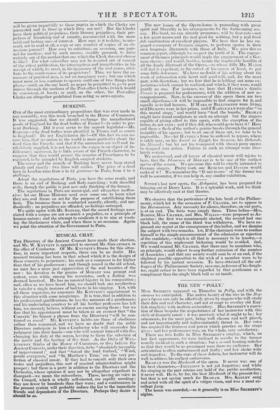POST-OFFICE CLERKS AND NEWSPAPER PROPRIETORS.
ON Monday, Mr. Hiram moved for certain returns connected with the office of Clerks of the Roads in Dublin, in reference to the distribution of newspapers there ; and on Wednesday, Sir RICHARD VYVYAN put some questions (which were not answered) on the subject of the Clerks of the Foreign Post-office in London, in refe- rence to the importation of newspapers. We are happy to find. that the arguments and statements which we promulgated in our last Number have found. so speedy an entrance to the House. Out of it, the Courier has paid us the compliment to copy the whole of our very long paper; and by his commendation—with the quasi official qua- lification of which, in respect to the Duke of RICHMOND and Lord. BROUGHAM, we find no fault—has given the cause the advantage of his support. It is, indeed, in an especial manner the cause of the Newspapers, however they may see fit to treat it ; for there can be no doubt that their interests are seriously affected by the abuses that we last week pointed out. The tax that is levied. on them in the shape of charges for Foreign information, constitutes no inconsiderable addition to their other heavy burdens. We do not exaggerate when we rate it at 101. or 12/. per week. The tax is aggravated by the fact, that it bears no proportion to the actual circulation. A journal which circulates 2,000 per day has to pay to the Exchequer but a fifth part of what is due from a journal that circulates 10,000; but the Post-office recognizes no such ride of proportion and.-justice. It cannot be the interest of the public to create or cherish a monopoly in the newspaper market, more than in any other; and yet, in the nature of things, burdens like those imposed by the Clerks lead directly to such a monopoly. Not only do the abuses in the Foreign Office press heavily on the production of newspapers, they tend directly to hinder their circulation when produced. In what respect they do so in Ireland, where the privileges of the Clerks of the Roads are at one time exerted to enhance the price of a newspaper some 10 per cent. more than it ought to be, and thus to limit the number of the buyers,—at another, to put out of the market all news-agents but themselves, and thus to limit the number of sellers,—is suffi- ciently obvious; but there are other causes at work. The Clerks of the Post-office may have a higher interest than their mere pro- fits as agents to stimulate them—they may have the profits of' pro- prietors also. Do we speak hypothetically? Why, it is in evidence that Sir FRANCIS "'REELING was part proprietor of a newspaper for twelve years ! Is it to be supposed that any clerk in the esta- blishment, looking to the injury or the advantage which he might derive from Sir FRANCIS FREELING'S good or ill will, would. not give a currency and commendation to Sir FRANCIS'S paper, which he denied to others ? We do not mean that Sir FRANCIS was to he influenced. by such considerations, but such would be the work- ings of human nature in the breasts of his dependents. There are numerous motives besides, which may influence a Clerk of the Post-office to favour one paper and to repress another. The mere prejudice against a brother in the trade is sufficient. A very great number of one description of newspapers—the Evening Papers, for instance—go to the country through the Post-office Clerks. Is it supposed, that where an advantage is to b i e given, it will be given impart'ally to those papers in which the Clerks are interested and to those in which they are not? But the Clerks have their political prejudices, their literary prejudices, their pre- judices of friendship and of enmity, unconnected with the more solid and lasting ones of interest. How easy is it to delay, to mis- send, not to send at all, a copy or any number of copies of an ob- noxious journal? How easy to substitute, on occasion, one jour- nal for another; and by such means, steadily pursued, to drive entirely out of the market that one which the Clerk does not choose to like ? For what subscriber may not be wearied out of conceit of the ablest publication, the interruptio:Js and irregularities in his receipt of which, he must, in his ignorance of the real cause, attri- bute to the carelessness of its proprietors? This, we have the as- surance olpractical men, is not an imaginary case; but one which must more or less continue to operate until one of two things take place,—until, on the one hand, Do paper be permitted to go by post unless through the medium of the POst-office Clerks (which would be consistent, at least); or until, on the other, the Post-office Clerks are altogether prohibited from acting as news-agents.



























 Previous page
Previous page